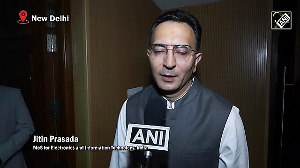Wine importers and distributors as well as owners of Indian vineyards are on a new high. Upwardly mobile Indians are taking to wine drinking in a big way -- uncorking brands such as Turning Leaf, Cabernet Sauvignon, Sangre de Toro and Rosemount Estate Cabernet Sauvignon to celebrate.
Wine tasting sessions and wine dinners have made wine drinking a trend. Industry sources say that on an average every year about 50 wine tasting sessions are held in Delhi, Mumbai and Bangalore. A Rabo Bank study conducted two months back shows that the annual Indian consumption of wine is growing by 20 per cent.
In fact, importers report even better sales. Says Aman Dhall, executive director of Brindco Ltd, the country's biggest wine importer with a portfolio of 422 labels: "This year we will see a 30-40 per cent growth in volumes and 50-60 per cent growth in business which reflects that the wine market is maturing."
To cash in on the growing popularity of wines, a company like Moet-Henessey, which is known more for its champagne and cognac, also introduced a selection of 24 wines into India this year.
"There is a greater demand for good quality mid-priced wine brands compared to two years ago when only high-end brands were sold," says Moet-Hennessey India's managing director Ashwin Deo, explaining the reason for bringing wines to India.
The US-based Ernest & Julio Gallo too set up office in India last year and launched brands such as Wine Cellars Chardonnay and Carlo Rossi Red.
The company's country manager Rukn Luthra says that it has seen 100 per cent growth ever since. It also appointed Radico Khaitan as its exclusive distributor. Currently, there are at least 15 importers who sell about 450 imported wine labels in India.
The news for home-grown wine players -- Sula Vineyard, Chateau Indage and Grover's Vineyard -- isn't bad either. Besides bottling their own wine labels, Sula and Chateau also bottle imported wines from South Africa, Chile and Australia in their wineries and their business is growing.
"In 2000, we produced 5,000 cases. This year we will touch 39,000 cases. And we are still running out of stock," says Adrian Pinto, marketing manager, Sula Vineyards.
Ritu Dalmia, owner of Italian restaurant Diva, endorses his view. "Since we opened, wine sales have grown three times. Earlier, people used to ask for red or white wine. Now customers ask for specific labels. We are currently averaging sales of 320 bottles a month," she says. Diva has expanded its wine list from 31 in 1999 to 171 today.
Similarly, Mumbai's fine dining restaurant Indigo, which became the first Indian restaurant to win the coveted French wine guide Wine Spectator award this year stocks at least 220 varieties of wine in its cellar.
India currently imports 72,000 wine cases (nine litres to a case) a year. About 32,000 of this are Bottled in Origin and the other 40,000 cases are imported in bulk flexi bags, which are subsequently bottled by Indian wineries. Besides this, about 12,000-15,000 wine cases are sold through the grey market.
Yet the Indian market is way behind heavy wine drinking country like France where the annual per capita consumption of wine is 42 litres. While China's per capita consumption is 375 ml, India's per capital consumption is literally a sip at 4.5 ml.
However, of the total wine imports about 85 per cent is consumed by hotels and about 15 per cent by stand-alone restaurants. In fact, restaurants owners fear that despite increasing popularity of wines, their sales may suffer following the duty free entitlement scheme announced by the government that favours the five-star hotels.
This year's exim policy allows hotels to use five per cent of their forex revenue to import alcoholic drinks without duties.
Says Rahul Akerkar of Indigo, "Since wine duties range from 150 to 264 per cent, the waiver helps five stars to price their wines lower, he explains." Adds Dalmia, "Unlike us, five-star hotels earn forex from room tariffs."
Although wine consumption is picking up, high import duties continue to spoil the good cheer. Add to this the heavily fluctuating state duties that are slapped on the product.
As a result, the cost of a bottle of premium Ernest & Julio Gallo Sonoma County Chardonnay could vary between say Rs 3,500 in Delhi and Rs 1,900 in Bangalore. "If the government reduces duties, the imported wine business could grow by an additional 30 per cent," says Luthra.




